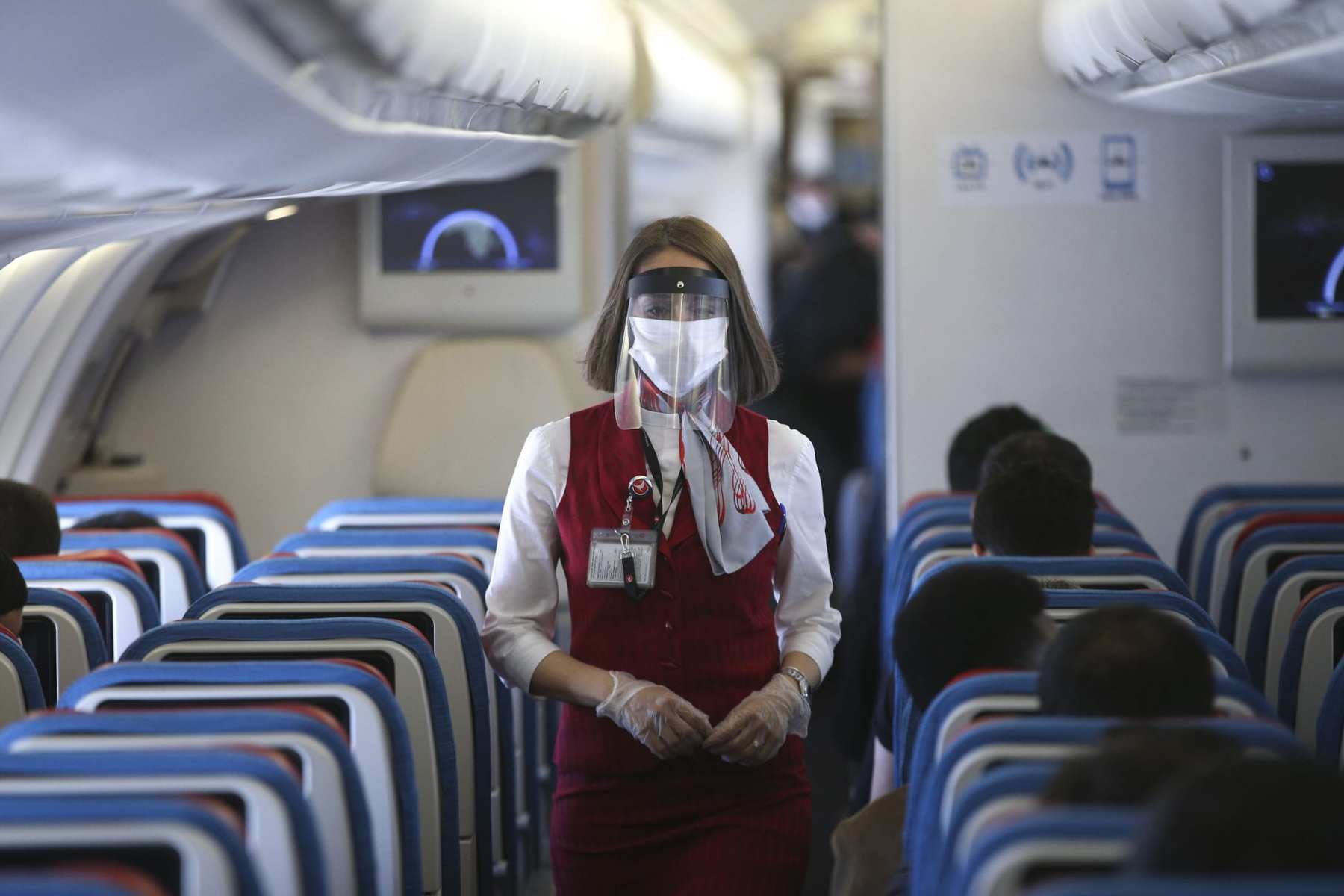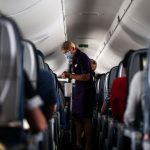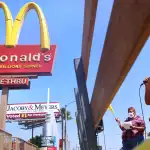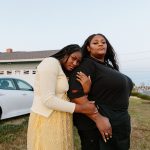The flight attendant rushes through the familiar carpeted halls of an airport, beads of sweat gathering in clusters under the mask secured tightly around her ears. She’s heading toward what has become an all-too-familiar experience.
She knows now to carry a portable fan with her on each trip to cool off after hours wearing the mask. She’s learned to bring her own sanitation wipes now, too, so she can get to work as soon as she’s inside the plane. Her jumpsuit, the phone, her area in the back galley, her seat, the counters — they all get wiped down. A portable hand sanitizer dangles from her lanyard as she leans down to clean.
She’s required to wash her hands every two hours, but she does it more often than that. The passengers must wear masks at all times, though there are always a few who need to be reminded. So she guzzles down as much water as she can before they start to pile in — that’s fewer times she’ll have to pull down her mask when they’re up in the sky. Eating is to be avoided as much as possible. But in a pinch, she’ll hide away in the back galley to have a snack.
And Mitra Amirzadeh, like many other flight attendants, knows a tougher season — a more unfamiliar one — is on the way.
If Thanksgiving is any indication, thousands more passengers are about to crowd into Boeing 737s and Airbuses across the country. In the 10 days surrounding the Thanksgiving holiday, the Transportation Security Administration screened 9.5 million passengers, more than any time since the pandemic began. Passenger volume at major carriers is down about 62 percent compared to a year ago, according to Airlines for America, the trade group that represents the major airlines. But some carriers, including American and United, have started to book their planes at full capacity, scrapping the early pandemic policy of leaving middle seats open, and Christmas is expected to bring another wave of travelers.
“The Europeans are all staying in their houses. They’re not traveling. They’re not gathering. But this is America,” Amirzadeh said, “where we do what we want when we want. All we can do [as flight attendants] is try to do the best we can.”
A travel surge will bring a new set of challenges for the staff that has to work the aircraft aisles, most of them women and many of them older. Already, more than 2,000 flight attendants have tested positive for coronavirus throughout the pandemic, according to the Association of Flight Attendants-CWA, a union that represents about 50,000 flight attendants, 80 percent of whom are women.
It’s another way the virus has magnified the country’s existing inequalities. Women, who for decades have dominated fields with high degrees of customer interaction — servers, cashiers, flight attendants — make up the majority of essential workers. For nine months, they’ve been the ones who have been most likely to clock into work with the fear of coronavirus on their minds and the most likely to be out of a job with the pandemic to blame.
The flight attendant union led a massive lobbying effort earlier this year to secure protections that kept most of its membership employed through September 30. But when the protections expired, tens of thousands of flight attendants were furloughed across most major airlines. The ones who stayed had more seniority, or, like 37-year-old Amirzadeh, were just lucky enough to work for one of the few airlines that hasn’t yet started furloughs.
Or maybe lucky isn’t the best way to describe it. Amirzadeh knows that fewer flights means less overtime work to pick up — something most rely on to fluff up their pay. She compares the daily fight to pick up additional hours during the pandemic to the “Hunger Games.” Amirzadeh’s pay is down 30 to 40 percent from a typical year since March.
Working also doesn’t mean security. Every day when Amirzadeh gets home to Orlando, she walks in through the garage and removes her uniform there. She never brings it, or her luggage, in the house.
Because she’s in the sky with people who could have the virus on a daily basis, people in her family have stopped wanting to see her. She sat outside on Thanksgiving while her family ate inside a glass porch. Her dentist won’t see her. Her old nail salon won’t either.
If someone were to bring coronavirus into her home, infecting her husband and her 13-year-old daughter, she knows it would most likely be her.
“As a human, it’s a little nerve wracking,” Amirzadeh said. “As an employee trying to stay employed, where there are so many flight attendants that are currently furloughed at other airlines, I’m grateful to have any work to do.”
And there’s the rub for flight attendants eyeing the busy holiday season with apprehension: How do you square fear with need?
Going into weeks that are sure to see a boost in air travel — and COVID-19 concerns — Sara Nelson, the president of the flight attendant union, finds herself in a similar position to the one she was in when this all started.
In March, Nelson played a critical role in crafting a different kind of bailout for the airline industry. She didn’t want her workers to be forgotten, and as the leader of the union representing flight attendants at 20 airlines, she knew she had some power to ensure that they wouldn’t.
Her proposition to the airlines, which at the time were seeking a multi-billion bailout and incurring widespread criticism, was simple: “Look, the public hates you, you’re not going to get this money,” Nelson recalls telling the industry. “But my bill will save the airlines and save the people of the airlines.”
It was convincing. In late March, the first round of the coronavirus stimulus plan included a $50 billion bailout for the airlines, about half of which had to go to the Nelson-backed Payroll Support Program (PSP). The program used grants to cover 70 percent of payroll through September 30 and restricted airlines from furloughs and cutting hourly pay rates. It also capped executive compensation for two years after the relief ended and banned stock buybacks.
The grants kept workers employed and on their health care while airlines continued operating. But the program was timed to end when it was expected the economy would rebound and the national emergency would be over. And yet coronavirus dragged and Congress, unable to come up with a compromise on a second round of aid, let PSP expire. Flight attendants like Amanda Steinbrunn fell through.
The 26-year-old was furloughed from United Airlines on October 1, losing health coverage that kept her medications affordable. Steinbrunn is a cervical cancer survivor who has chronic asthma, bronchitis and migraines. One of her medications alone is $98 for six pills.
Since the furlough, Steinbrunn, who is part of the flight attendant union, has been applying to jobs — 67 applications sent by the end of November — but nothing has come through. Her unemployment checks barely cover her mortgage and her medications. For the thousands of flight attendants out of work, Streinbrunn said it felt like abandonment when Congress didn’t act.
“We feel forgotten,” Streinbrunn said. “We see no hope of [Congress] getting it done, when we were there doing our job, getting it done, all summer.”
In the past few days, some hope has returned in the form of a $908 billion relief plan with broad support that could end the months-long impasse between Republicans and Democrats. It includes $17 billion to continue the airlines’ Payroll Support Program. And Nelson, the union president, has been out front, drumming up support for it.
“These are essential workers who have been on the front lines since the beginning of the pandemic and are the ones who are shouldering the brunt of this continued financial stress,” she told Fox News early this month. “We’re going to get it done.”
When she appears on cable news, Nelson prominently displays a photo behind her on a bookshelf. It shows a smiling Paul Frishkorn, the bubbly flight attendant and the union’s benefits expert who died in late March — the first known flight attendant death due to the coronavirus.
She thinks of him when she imagines the months ahead.
“People are hitting pandemic fatigue and you don’t have a clear narrative right now — there’s a part of the country who believe all this is a joke,” Nelson said.
For those up in the sky, it’s easy to see the shift that’s taken place this year. At the start of the pandemic, Amirzadeh, the Orlando flight attendant, said some people would board the planes in hazmat suits and surgical booties. As the months wore on, people got more comfortable. At one point, she had to put two passengers on the no-fly list: one woman who she had to remind seven times to put on her required mask properly and one man who just flat out refused.
In the past few weeks, Amirzadeh said she’s noticed passengers become more careful again — but planes are also about to get more crowded and harder to manage.
This year, airlines have beefed up their cleaning protocols, with more frequent deep cleanings and regular sanitation in the cabins at all the major touch points, like the tray tables and the lavatories. According to the Centers for Disease Control and Prevention, most viruses and germs don’t spread easily on flights because of the way the air is circulated and planes’ ventilation systems. So far, studies have shown cases of likely transmission on airplanes, but due to lack of contract tracing, it’s been difficult to say for sure if coronavirus has spread on flights.
But the more crowded flights get, the more difficult it becomes to control potential spread through social distancing and reduced passenger-to-passenger contact. That’s why the union and the airlines have urged workers to redouble their safety efforts, and Nelson is ensuring the airlines keep up their end of the bargain.
When The 19th called her, Nelson had just been on the phone with the administrator of the Federal Aviation Administration, Stephen Dickson, talking about precisely that.
Ultimately, there is one other reason why getting planes flying safely and people flying regularly again is central to any kind of recovery: Cargo and commercial planes, many of which have been grounded due to the downturn, will be relied on to quickly distribute COVID-19 vaccines.
But, Nelson cautions, “This stuff doesn’t happen overnight. It requires people, planes and routes.”
It requires money. And it requires risk, said Steinbrunn, the furloughed United flight attendant.
“As a flyer during the holidays, you can respect that you can still go see your family during coronavirus and there are people who are helping you get there,” she said. But remember, she added, “They are hurting.”






